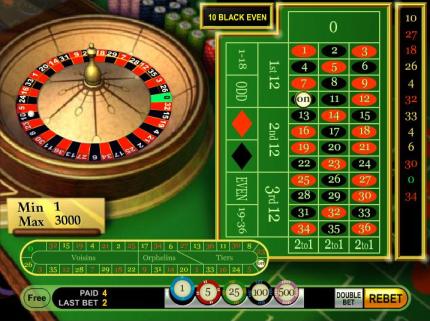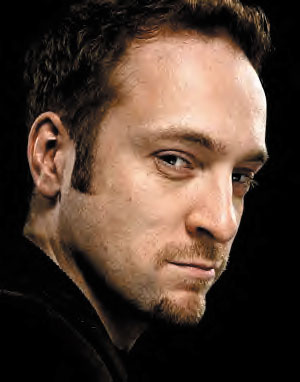Naturally, I won some money. Is that because I am a mathematical genius? No, everyone except the truly elite is going to lose money in a casino by knowing just enough probability to be dangerous while the truly stupid are going to be the foundation of any gambling town.
Instead, I keep it simple and Roulette is what I do after I have had fun. What, you say? At 5.26 percent Roulette is not nearly the best odds game in a casino. You're right, if you can find a Texas Hold 'Em game, there is no house edge at all, so it is going to be the best odds, and Blackjack only has a .20 percent advantage for the house if you find a single-deck chute, but Blackjack involves a lot of memorization so it is better suited to people who like geometry than those who actually know any math. I instead go for roulette because with a little luck you can make a lot of money much faster.
As always happens to me, a camera crew happened to be in the Sahara, where I stayed (hey, if it's good enough for Cary Grant, it's good enough for me) and they figured I would be the perfect guy to help Elvis celebrate his 75th birthday, should he be alive in some Bubba Ho-Tep type nursing home.
The first thing I do when I reach the table is ask the dealer what color is hitting. Yes, in a lot of casinos it is printed right there in lights but I want to engage the croupier. From there I decide where I am going to go. And it will only ever be red or black.
Roulette has 36 numbers, 18 each of red and black plus, at least in America, two 0s that are green. It is truly The Devil's Game because, if you are like me, you immediately added up all those numbers and realized they 1+2+3 ... 36 comes out to 666, the Number of the Beast. But it won't be a gambling Hell if you keep emotion out of it. Roulette became a favorite of mine because, as legends go, Blaise Pascal invented it while trying to create a perpetual motion machine and I like my science history. He ended up with a wheel a lot more famous then he is, outside science circles.
I said above that the 'house edge' is 5.26% and here's how that is derived: On a single number win, like if you put a chip on 1 and the marble lands on 1, the payout is 35 times your bet. But there are 38 numbers. So you have a 1 in 38 chance of winning 35 times your bet but a 37 out of 38 chance of losing your bet. So 1 X 37/38 + 35 X 1/38 = - 0.0526 for you. Meaning the house has a 5.26% advantage.
Obviously a 5% advantage can eat up a lot of your money quickly so you have to be very lucky if you are throwing chips onto various numbers or combinations. You can win, though, if you remember two things: (1) mathematically, the game is designed so that you will lose eventually and; (2) you are not betting on the odds of a color hitting, you are betting on the odds of you losing multiple times in a row. A very different thing.

I'm not in the gambling advice business so I will not go into the mechanics of elaborate systems like the Martingale System, though it's one I use, or a system based on the Fibonacci Sequence, since that would be a whole article. If you are reading this site at all, you know what I mean about playing the math instead of playing the game.
Why not use a system? They all presuppose probability in a universe that does not actually exist; a universe where, for example, 4 consecutive reds means you are more likely to hit a black. But probability does not work that way. If it has hit red 8 times in a row, the wheel does not know it. If you were calculating the 'odds' of that happening you would know that the chances of hitting the same color 8 times in a row, 1/2 * 1/2, etc., is 1 in 256 - and that's just red and black, green is always a moneymaker for a casino - but in reality the chance is 1 in 2 when you put your money down.
So how do you make any money? You will need to have some first and you need to find a table that does not have a maximum less than 30 times the maximum. That is important because you have to start your bet low enough that by continually doubling you can get it back. Sounds like the Martingale system above but it's far less clever because each time you win, you reset your bet back to the minimum. If I lose, I keep doubling.
Are there pitfalls? Sure. In Monte Carlo, tales say red once came up 39 times in a row. That will break anyone because if you hit the casino maximum bet, they will not raise it for you on a chance game. Not ever. They already have your money.
As I noted above, the math, that pesky -5.26%, also says I cannot win if I stay too long. Say you pick red as your color. The spin will come up red only 18 out of 38 times, due to those two green 0s in American Roulette (one in some places in Europe). That means red hits only 47.37% of the time. If you are statistically inclined that probability is a binomial distribution you can then make it into standard normal distribution which will tell you if you spin the wheel 38 times, there is a 99% probability that the ball would land on red 10 times or more and an 83% probability that in 38 tries the ball will land on red 15 times and 50% at 18 spins out of 38. But the break-even point is 19 spins out of 38, since bets on red or black pay 1 to 1, and the probability of 19 red spins in 38 is only 37%. So make your money and pocket it. Then start over another time.
Is science and/or math always going to be ahead of casino bigwigs? No, and neither will I. One of these times I am bound to lose, it just hasn't happened yet - but probability says I will. I minimize that by never getting too clever.
British illusionist/magician Derren Brown got too clever and claimed, in one of his television programs, that he could Take Down A Casino - by predicting and betting on the correct number on a Roulette wheel by quickly analyzing the speed and trajectory of both the ball and the wheel before the croupier waved no more bets.
He came close, betting on the black 8 instead of the red 30 next to it. Odds of his being right next to the winning number? Let's say just under 1 in 12, since no one in their right mind bets on green. He hypnotized people on the street to raise the money for the bet for that spin of the wheel, which was interesting enough, but he needs to stick to bunnies and hats and leave the science to experts. Or science bloggers.

Derren Brown. Entertaining illusionist but epic fail as a physicist.





Comments